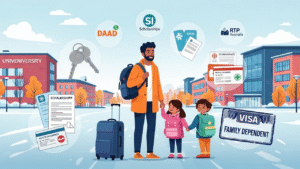You are a learner, a scholar, or researcher. Perhaps you are in a silent room in Spain, India, Nigeria or U.S. and wondering where to take the next project. This solution may be located in an unusual direction: Iceland. It is a land of glaciers, volcanoes, big ideas, research friendly support of its visitors.
There is an obstruction. The flights are costly. You will be in need of shelter. You will require time off work. Research materials. Even special permits perhaps. All this sounds like too much, until you learn about the Icelandic research mobility grant.
You are not the only one who should read this guide: you are a scholar with something valuable to explore, and the desire to do so in a place that promotes new thinking.
An Icelandic Research Mobility Grant: What Is It?
An Icelandic research mobility grant is an economic prize to facilitate the realization of short-term or medium-term research project in Iceland by researchers, and most particularly by foreign researchers. You could be a student of glaciers, the climate policy, language, marine biology, and literature to name some there. The chances that Iceland has the financing, environment and jurisdiction backing to support you are not farfetched.
Such grants are not loans. They do not just congregate at the elite institutions. They are functional tools so that visiting researchers may:
-
Visit Icelandic scholars
-
Laboratories, archives, or ecosystems in Iceland
-
Carry out field research and capture first-hand data
-
Become part of research communities and research events
-
Publish or co-author by Icelandic case or resource
These grants in most instances contribute to stay of 1–12 months depending on the nature of the project and the organization paying.
Why Iceland? Why Now?
Iceland is not a postcard. It is a center of specialty exploration, with the world focusing in such areas as:
-
Climate science, arctic science
-
Geothermal systems eco-power replenishable power
-
Nordic literature and language preservation
-
Oceanic ecology and marine life
-
Earthquakes and geology
-
Folklore and anthropology, as well as creative arts
-
Gender, policy development, and sustainability
Iceland has a population of less than 400,000 peoples and has a significant influence, in terms of research contributions. Its universities, research centers, and even governmental agencies are greatly welcoming to co-operation with foreign scientists.
And, unlike most other countries, Iceland does not just want visiting scholars to observe, but to take an active part.
Who is Giving These Grants?
It is not that there is only a single entity of Icelandic research mobility grant. It depends on which field you are in, what your background is and the organization of your work, so there are several sources and types.
The following are some of the most frequent ones:
1. The Iceland Centre of Research (RANNIS)
-
Subsidizes global research collaboration
-
Gives project-based and institutional collaborating grants
-
Researchers of any rank such as postdocs and PhDs are welcome to visit
2. NordForsk Mobility Funding
-
Nordic cooperation includes part of Nordic Council cooperation
-
Facilitates collaborative research and exchange of personnel between the Nordic countries and foreign organizations
-
Very good when working on a joint project where at least one of the partners is Icelandic
3. Erasmus+ Mobility of Staff and Researchers
-
Person who represents a European university may become eligible to participate in Erasmus+ mobility
-
Trips abroad are funded to cover research visits, teaching or shared workshops
-
Administered in many cases by Erasmus office of your home university
4. Institutional Grants
-
In Iceland there are universities such as the University of Iceland, Reykjavik University and Iceland University of the Arts which provide bespoke support to visiting researchers
-
May also be used with internal or departmental funds
5. Bilateral Programs: Singapore and Malaysia Regional Programs
-
There are joint measures between Iceland and the other countries (e.g. to Germany, Canada, Nordic / Baltic regions) in some grants
-
Available on ministries, embassies, or academic foundations
Who Can Apply?
One of the most encouraging things about the Icelandic research funding system is its accessibility.
Typical eligible applicants include:
-
PhD students planning to conduct fieldwork or thesis-related research
-
Postdoctoral researchers building international networks or collecting data
-
Master’s students enrolled in programs with a research component
-
Independent researchers or artists affiliated with recognized institutions
-
University faculty participating in exchange or co-teaching programs
-
Scholars applying with Icelandic co-supervisors or hosts
What’s important isn’t your title—it’s your plan. Icelandic funding bodies want to know:
-
What you want to do
-
Why it’s valuable
-
Why Iceland is the right place to do it
-
How you’ll collaborate with local institutions or researchers
Which Fields of Study Are Most Supported?
What Fields of Study Are Eligible?
Most of the fields of study can be eligible, though some areas of research are also particularly well-favored since they also suit the priorities of Iceland and the world in general.
The following are some of the major themes:
Climate and Earth Sciences
Countries that are natural laboratories include Iceland as a laboratory on climate change, glacier science, geothermal energy, and seismic activity. There are usually grants to projects related to sustainability, energy transition, or climate adaptation.
Marine and Arctic Studies
Iceland enjoys fertile marine environments surrounding it and therefore includes research on fisheries, marine biology, Arctic governance, and oceanography.
Studies in Culture and Linguistics
Literature, Old Norse literature, Icelandic language, folklore, or other projects tend to have institutional support robustly either by way of humanities faculties or cultural groups.
Gender, Equality, and Social Sciences
Iceland is a superb destination location to conduct social policy research, feminist theory or research of labor rights given the fact that it has been a leader in those aspects.
Technology and Innovation
There is also an increasing space around data science, clean tech, digital humanities, and engineering-based research, in particular to the extent that this research is related to sustainability or regional development.
What is the Amount of Support of These Grants?
It depends, but this is what you get, more or less, of a well-funded Icelandic research mobility:
| Funding Item | Estimated Range |
|---|---|
| Monthly living stipend | €800 – €2,000 |
| Travel grant (round trip) | €300 – €1,200 (depending on origin) |
| Equipment or field costs | €200 – €1,000 (project-based) |
| Housing subsidy | Often included in monthly grant |
| Visa or insurance support | Sometimes covered |
Living expenses in Iceland are expensive and with this factor it is not an unusual thing to create grants that are livable yet humble. Students are likely to reside in the university guest houses or even collaborate with research labs in joint housing.
What Will Your Timeline Be Like?
Start early. Always. Typically, the Icelandic research grants command 2–6 months in preparing the grants. That includes:
-
Locating the host institution or researcher in Iceland
-
Applying for a letter of invitation
-
A budget and research proposal writing
-
Gathering records (CV, transcripts, letters of support)
The deadlines are different, depending on the program, but most of them are approaching:
-
Fall-semester visits occur in February to April
-
Spring semester visits or summer field work in September to November
And take this to mind: it may be flexible, but Iceland housing and travel can be expensive — the later you delay.
Structure of a Good Research Proposal
When the research mobility funding scheme of Iceland is the door, your proposal is the key. A sound research proposal should lay out what it is you wish to do, why you wish to do it in Iceland, and how your project is going to generate some value to you as well as your host.
This is what you ought to put in your proposal:
1. Title and Abstract
The title should be short and descriptive. Write in your own words, describing your project in a paragraph or two without using excessive jargon. Simplicity is the goal.
2. Objectives
What are the study questions or objectives? Write them down in 2–4 bullet points, or even in a short paragraph in case you prefer.
3. This Is Applicable in Iceland
Why Iceland? Discuss the relationship between what you are writing about and the Icelandic context in terms of climate, language, ecosystem, history, or institution.
4. Methodology
Tell them what you will really do. Fieldwork? Interviews? Data analysis? Trips to archives? Be very precise and possible.
5. Timeline
Supposing you are staying 3 months — what about the first month, the second and the third? This demonstrates that you have taken it into consideration.
6. Expected Outcome
Are you going to write a paper, write a chapter, submit data, or present a paper at a conference? Communicate what you are going to generate.
7. Budget Overview
Include an estimate of the costs you anticipate: housing, travel, meals, insurance, materials (in case the grant requests it).
What Reviewers Are Seeking
It is not Icelandic reviewers who are interested in the most complex research. They want reasonable, implemented, organized, and realistic plans.
The thing that makes your application a very hot one is the following:
-
There is a connection with the Icelandic environment, people, and institutions
-
Clear goal setting and planning that is achievable
-
An invitation by an Icelandic institution or faculty member that has been confirmed
-
Possibility of cooperation or academic usefulness in the long run
-
Support of the national or regional priorities (climate, culture, gender equality, etc.)
The proposal is more significant than the reputation of your university or the popularity of your work done in the past — even when your subject is as specific as you can make it.
True Tales: Those Who Received Funding as Students and Scholars
Elena – Student in Marine Biology Postgraduate Program, Spain
Elena was awarded a 4-month Icelandic research mobility grant to do her field research with the University of Akureyri, focusing on the coastal fish species. She located her host professor via a marine sciences journal, contacted her via email, and received a letter of support in two weeks.
Her advice? Do not make the email sound like a job application. All you need to do is explain your interest clearly, and why Iceland can be a fit. The majority of professors are thrilled to even assist with good ideas of research.
Mikael – Canada, Cand PhD in Folklore Studies
Mikael did 6 months as a student in Reykjavik studying oral power and medieval work. He was being funded on a bilateral Canada–Iceland exchange program through his native university. He states:
“They were pleased that I was not just doing a study about Icelandic history but I even wanted to relate it to current cultural identity.”
Naledi – South Africa, Researcher in Renewable Energy
Naledi also uses NordForsk application to get involved in one of the collaborations project led by geothermal energy in collaboration with Reykjavik University. She spent two months as a student and was co-author of one paper, and two years later returned to Iceland to do a postdoctoral fellowship.
Errors That May Cost You the Grant
Powerful projects are rejected as well. The following are some of the most typical errors you might make, and the way to avoid them:
-
Failure to call a host in Iceland
Most grants need to be affiliated. Do not think that you will be able to apply without this step. -
Using vague or broad goals when writing them
It is not enough to explore the climate change. Be specific. What is the question you are responding through? How do you do that? -
Contempt of deadlines
The deadlines of application are months earlier. Others are annual once only. -
Poor reference letters
Do not ask your referees to discuss your grades; ask them to comment on your research potential, reliability, and motivation. -
Fictions in their budgets
When you request excessive (or, to the contrary, insufficient) funding, the reviewers might consider your plan undeveloped.
The Visiting Researcher Life in Iceland
Cost of Living
It is indeed costly, but with advanced considerations it is bearable. Lots of researchers also hire dormitories or temporary accommodation buildings adjacent to the university. It is expensive to shop in groceries and to cook at home saves.
Adjustment and Weather
In winter, there is not much daylight or we can say, cities are well developed, illuminated and inter-connected. Warm summers are full of cultural festivals. According to most visitors, their experience is of an environment that is both quiet and inspiring, which makes them capable of staying focused on work.
Language
English is popular and mostly used in institutions of learning. However, in case your work is related to language or history, then you could require the assistance of native people in these aspects.
Networking
This is a small and tight research community in Iceland. Future collaboration can be achieved through attendance of seminars or events in the university. The visiting researchers are welcome in many institutions.
FAQs: What You Need to Know Before You Apply
Is it necessary to talk Icelandic?
No. The English language domination of most of the programs. However, understanding some fundamentals is useful in everyday situations and dealing with others.
Is it possible to travel with family?
It is not all grants that accommodate the dependents. Terms of every program should be checked.
Does it cover health insurance?
There are some grants, which involve health cover or must indicate whether you have it. This should always be checked in advance.
What will happen in case I am not selected?
You will be able to apply again next year or search other similar programs through one of the Nordic networks or Erasmus+ or institutional partners.
Is it possible to work in Iceland?
On a grant-related visa, you may only be allowed to work in research or not at all. Likewise, seek help of your host institution.
Additional Sources of Funds to Look At
Unless you receive an award or are eligible to receive an award of a national Icelandic research mobility grant, look at:
-
Nordplus – Nordic/Baltic exchange of students and teachers
-
Arctic Research Support – Continued support through Polar research groups
-
Your exchange office of home university – Difficult to come by source of travel money
-
Artist residency programs – In case that your study is a creative one
-
Language and culture institutes – These provide financial assistance in the short-term study or touring the field in the humanities
Conclusion: A Border Should Never Limit Your Discovery
Iceland is distant. Hostile. Tiny. But it is huge in the sense of research. It is a hotbed of great thinking, green innovations and international dialogs concerning the future. And your open invitation to be included in that conversation is Icelandic research mobility grants.
It is not necessary that you are a senior scholar. It does not have to be fluent in Icelandic. All you have to do is be curious, have a strategy, and have a justification to contact.
The money is out there just waiting to be picked up by another person just like you.








